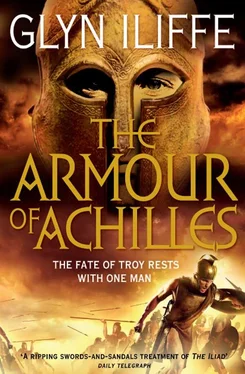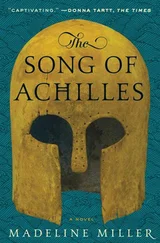Glyn Iliffe - The Armour of Achilles
Здесь есть возможность читать онлайн «Glyn Iliffe - The Armour of Achilles» весь текст электронной книги совершенно бесплатно (целиком полную версию без сокращений). В некоторых случаях можно слушать аудио, скачать через торрент в формате fb2 и присутствует краткое содержание. Год выпуска: 0101, ISBN: 0101, Издательство: Pan Books, Жанр: Старинная литература, на английском языке. Описание произведения, (предисловие) а так же отзывы посетителей доступны на портале библиотеки ЛибКат.
- Название:The Armour of Achilles
- Автор:
- Издательство:Pan Books
- Жанр:
- Год:0101
- ISBN:9781447205098
- Рейтинг книги:4 / 5. Голосов: 1
-
Избранное:Добавить в избранное
- Отзывы:
-
Ваша оценка:
- 80
- 1
- 2
- 3
- 4
- 5
The Armour of Achilles: краткое содержание, описание и аннотация
Предлагаем к чтению аннотацию, описание, краткое содержание или предисловие (зависит от того, что написал сам автор книги «The Armour of Achilles»). Если вы не нашли необходимую информацию о книге — напишите в комментариях, мы постараемся отыскать её.
The Armour of Achilles — читать онлайн бесплатно полную книгу (весь текст) целиком
Ниже представлен текст книги, разбитый по страницам. Система сохранения места последней прочитанной страницы, позволяет с удобством читать онлайн бесплатно книгу «The Armour of Achilles», без необходимости каждый раз заново искать на чём Вы остановились. Поставьте закладку, и сможете в любой момент перейти на страницу, на которой закончили чтение.
Интервал:
Закладка:
But if Odysseus’s appearance was undistinguished and beggarly compared to the other kings who had flocked to Troy, the fact that he was of high birth was unmistakeable. His intelligent green eyes – full of a ready humour – were stiffened by an iron will; his face appeared kind and approachable at most times, but there was an authority lying just beneath the surface that no man would dare cross lightly. More than anything, though, Odysseus’s power was in his voice. When he spoke, men listened. He could still a room with a simple sentence and sway even the most adverse opponents with his smooth tones and well-reasoned arguments. There was no other man in the whole Greek army – neither the great Achilles nor the noble Diomedes, the kind-hearted Menelaus nor the fearsome Great Ajax – Eperitus would rather serve.
Standing a little behind the two men was the Ithacan army, arrayed in six ranks of a hundred men each. There was a low murmur of conversation as they waited with bored patience for the order to advance. They had stood there since the first light of dawn, after beaching their ships on the sandy coastline and marching up to the low line of hills that hid the city of Lyrnessus, but they did not complain as their spears and oxhide shields grew heavy in their hands. They had endured much in the past ten years and were no longer the mixture of inexperienced farmers and fishermen who had first answered their king’s call to arms. Now they were true warriors, hardened by the long years of fighting that had sifted the weak from the strong. Only those with an instinct for warfare and a fierce anger in battle had survived; the remainder had been killed long ago, their souls conducted to the underworld by Hermes, the shepherd of the dead.
In the front rank were the men of the royal guard. These were the heavily armed elite who had once formed Ithaca’s standing army in the days before the war. Well trained and highly motivated, with a fearless devotion to their king, they were the pride of the Ithacan army. Unlike the scavenged weaponry of the levied masses behind them, each guard was equipped with greaves, a plumed bronze helmet with cheek-guards, a breastplate and an oval shield with a flattened bottom edge and a bronze boss. Swords hung from their sides and long daggers were tucked into their belts, while their main weapons were the two spears that each man carried. The guards were the first in every attack and the last in any retreat, a perilous duty that had taken its toll over the years but which they carried out with unquestioning loyalty. Their losses were filled by the bravest men from the rest of the army – those who had proved their courage, skill and thirst for glory during the numerous battles with Troy and her allies.
Odysseus had selected the best warriors from the royal guard to head the assault on Lyrnessus. Each was in charge of ten men with a tall, well-built ladder between them; twenty ladders in total. They would march to the city concealed among the ranks of the other Ithacans, then dash out to the walls, place their ladders and begin climbing. The first up, Odysseus had insisted as he explained the assault to the men of the guard, would be the leader of each group – a dangerous job, especially if the walls were well defended, but one which would bring glory in the eyes of men and gods alike. As he had expected, his words were greeted with a chorus of demands to lead. The loudest were from Polites, who, though normally a quiet man, had a voice to match his giant-like physique when he wanted to be heard, and from Antiphus, the best archer in the army and one of its longest-serving veterans. These two were stood in the centre of the front rank now, the heads of their ladders resting against their calf muscles as they waited with calm indifference for the day’s action to begin.
On either side of the Ithacans were the armies of Argos and Phthia: the ranks of the Argives to their left, four thousand men massed behind the tall and handsome King Diomedes, with Sthenelaus and Euryalus at his side; and the black-clad Myrmidons from Achilles’s homeland of Phthia to their right, three thousand of the fiercest and most ruthless warriors in the whole Greek army, formed up behind the stout and hardy figure of Peisandros. Like their Ithacan comrades, both armies were a mixture of irregularly equipped levies fronted by a core of hardened warriors. Large numbers of ladders had been evenly distributed through their ranks, ready for the assault. Standing behind them were the archers of Locris, two thousand men led by the short and angry figure of Little Ajax. These carried no shields and wore only leather caps and jerkins of layered cloth for protection, placing their trust in the wall of infantry before them and the long range of their bows and slings.
In the rearmost ranks of each army stood men carrying tall, bronze-tipped pikes, normally used for ship-to-ship fighting because of their long reach. From the upper third of each pole a canvas banner streamed forward in the breeze from the sea, fluttering and snapping over the heads of the men below. The flags had been Odysseus’s idea earlier in the war, to help warriors find their units in the dust and clamour of battle and for other commanders to identify where their allies were amidst the chaos. Each army had its own symbol. For the Ithacans it was a blue dolphin, while the Locrians’ banner carried the device of a coiled brown serpent, in honour of the snake that Little Ajax wore around his shoulders at all times. Diomedes’s Argives fought beneath a golden fox on a green field, which was now torn and filled with arrow holes from always being at the forefront of battle. In even worse condition was the banner of the Myrmidons, the tattered remains of which featured an eagle with a serpent in its beak.
The four armies had been chosen by Achilles, who had insisted on leading the attacks against Lyrnessus, Adramyttium and Thebe, the cities that guarded Troy’s supply route from the lands of Mysia and Lydia in the south. Knowing there was none better who could give him the victory he so desperately needed, Agamemnon had agreed to Achilles’s demand. Not that the King of Men expected either city to present a problem. The walls, gates and ditches that protected them were nothing compared to the god-built battlements that had defended Troy for so long. Most significantly, the once powerful garrisons that had deterred earlier attacks had been slowly stripped of their best men to feed the battles around Troy, company after company marching away until all that remained were local militias made up of old greybeards and men wounded in the war – no match for a force of nearly ten thousand Greeks.
‘I can hear horses,’ Eperitus announced quietly. ‘Three of them, approaching fast.’
His senses had been supernaturally sharp ever since he had been brought back from death by Athena nearly twenty years before, and he was easily able to filter out the murmur of the soldiers behind him to focus on the heavy galloping of hooves from the other side of the ridge. Odysseus could hear nothing beyond the hubbub of voices, but he trusted his friend’s ears and gave him an assured nod.
‘It’ll be Achilles, with Patroclus and Antilochus,’ he said. ‘And about time too.’
A few moments later the thudding beat was heard by every ear, and then with a whinnying neigh and a barked command three horsemen appeared in silhouette at the top of the ridge, surrounded by a billow of dust. The riders paused for a moment to survey the massed ranks below them, then with a shout of ‘Hah! Hah!’ the first drove his horse straight down the slope towards Odysseus, followed closely by his companions.
‘What news, Achilles?’ Odysseus called, striding out to meet the riders with his hands raised.
Achilles pulled his horse’s head aside with the reins and leapt from the animal’s back, landing lightly a few paces in front of the king of Ithaca. He swept his black cloak back over his shoulder to reveal a well-made bronze breastplate and a sword, hanging from a baldric at his side. He carried no shield or spear and his head was helmetless, so that his long blond hair shone in the sunlight as he offered Odysseus his hand.
Читать дальшеИнтервал:
Закладка:
Похожие книги на «The Armour of Achilles»
Представляем Вашему вниманию похожие книги на «The Armour of Achilles» списком для выбора. Мы отобрали схожую по названию и смыслу литературу в надежде предоставить читателям больше вариантов отыскать новые, интересные, ещё непрочитанные произведения.
Обсуждение, отзывы о книге «The Armour of Achilles» и просто собственные мнения читателей. Оставьте ваши комментарии, напишите, что Вы думаете о произведении, его смысле или главных героях. Укажите что конкретно понравилось, а что нет, и почему Вы так считаете.












